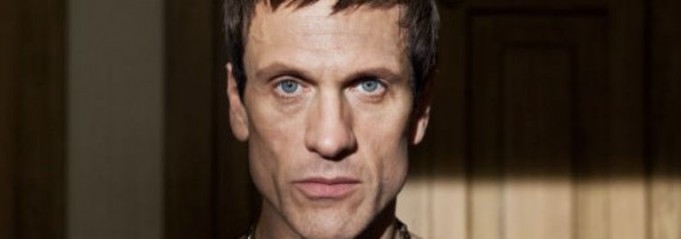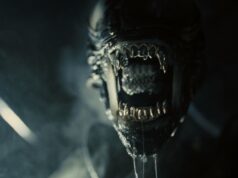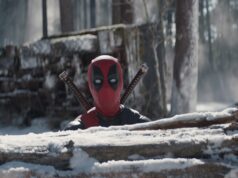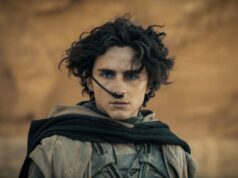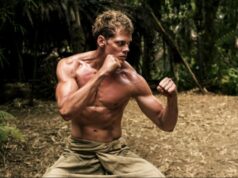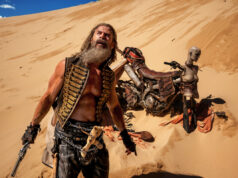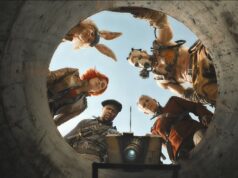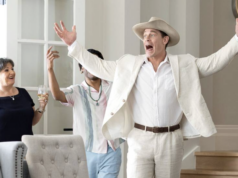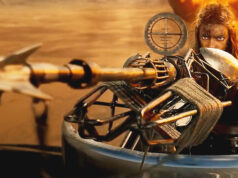You should all know British Actor, Simon Merrells from his various roles in TV and film; He has a prolific stage career with such prestigious organizations as the National Theatre and the Royal Shakespeare Company.
In 2012, he played in The WOLFMAN with Anthony Hopkins and Benicio Del Toro. On television he became well-known in SPARTACUS: WAR OF THE DAMNED interpreting Marcus Licinius Crassus, the main antagonist. In 2014, he played a major role in THE TOMORROW PEOPLE. We had a chat with Simon about his new film Index Zero, along with what it was like working on the very sexual and violent Spartacus.
Your new film “Index Zero” is about to make its international premiere as part of the official selection at the Edinburgh Film Festival in June. Tell us about the film and your role.
This film is a wolf pack of two, being myself and Ana Ularu. Our characters are almost in symbiosis, almost two sides of the same coin. We said when we were making it, that we were like some of the pack dogs that we’d see around Sofia, in the wilderness. We’d see the way that dogs would behave around each other when they were close and we were like that really in the film, so it’s really a two-hander. I got the script in London through my agent in an early draft. I auditioned for it, I auditioned for Lorenzo just the one time and something clicked. Right from the word go. There was a feeling that even though this film, for all intents and purposes set in the future, it has a certain storyline involving the world economic and ecological collapse and a giant barrier being built with a sustainable city inside that only the sustainable were allowed into. So we have a futuristic dystopian story. But Ana and I always said that at its base, it’s a love story. It’s about two people that won’t give up on each other and somebody who will fight for his mate come what may. So, at its base, it’s a very old, human story. That’s what we locked into when we were making it, really.
What attracted you to a Sci-Fi role?
You don’t want to do just anything, I certainly don’t now, because some projects don’t appeal necessarily and at the moment I feel able to say well “no I’m not really interested”. But for a lot of actors at different times in their lives need to work, you’re happy to work. But, certainly this is a very rich vein of material in the sci-fi world from absolute fantasy to the kind of thing we did which is really rooted in a terrifyingly plausible reality. I think our film, although it has obvious echoes of other films, obvious references – Children of Men, The Road – I really think it is its own thing that’s just ours, with the look and the feel of it. So I’m kind of proud of that, really. I became attracted to it as I was working on it if you like.
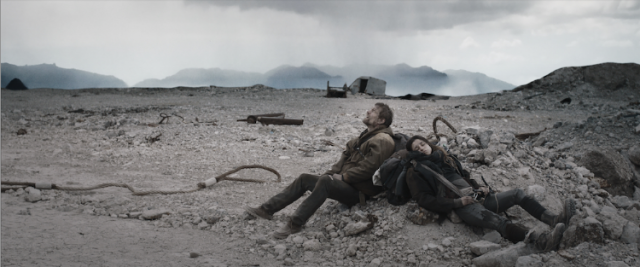
Back when I was a kid most futuristic films were all bright and shiny including many high-tech gadgets. Now, a lot of these films are quite dark, depressing and set amongst wasteland. Why do you think filmmakers’ vision of the future have changed so dramatically?
Everyone loved the Star Trek vision of the future where people got along and there was a strong federation of nations all committed to avoiding conflict. There was plenty for all and disease and want were a thing of the past. There’s nothing wrong with that, maybe that came through the post-war years, the optimism of the fifties, that infectious optimistic outlook. But there were still films in amongst those other ones that probably hinted at something darker even then, but I think now for better or for worse we’re all a little bit more aware of what can happen in our world through war or disaster and how it turns on a sixpence sometimes. Terrible catastrophes happen – we see them happening, we read about them and we see war zones. We can imagine this world. I suppose it comes from our fears. Maybe it’s cathartic to make films like this and maybe we are warning ourselves, saying it’s up to us to avoid this kind of future. I think we are possibly just a little more grown up, maybe.
Award winning director, Lorenzo Sportiello, is behind the film, but it’s his first feature film. What was it like working with Lorenzo?
You mention it’s his first feature but to be honest, you wouldn’t have known, but this guy had such a strong sense, a strong vision of what he wanted. He was completely in command of his medium technically and he gave sometimes quite brutal, but always on the button acting notes. If you turned in your thing as an actor where you maybe fell on some things that you’re comfortable with, he would just spot it and say no. He wanted to see on that monitor, down the lens something happening in the moment, for real. Until he was convinced, you’d keep doing it. So, although it was his first feature, we felt very much that we were in the hands of an auteur that knew exactly what he wanted. He was very much the director and I’d work with him again in a shot.
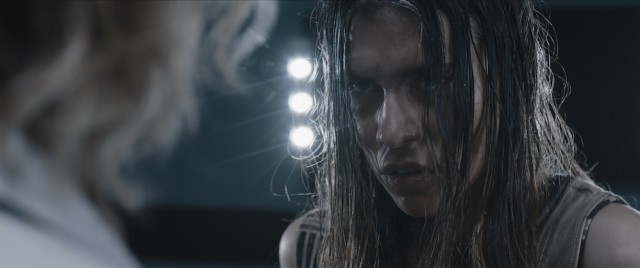
You’re currently filming the second series of US drama/fantasy Dominion for NBC, which tells the story of a young soldier discovering he is the saviour of humanity. How easy is the transition from British TV to American TV? Have you noticed any major differences?
The catering! I have just finished filming for season two of Dominion in Cape Town but it’s an American production with an international cast – some South African actors, some Australian actors, American and quite a few English actually. To be honest, when my work started to become interesting on camera, whether it’s TV or film, that started when I began filming Spartacus, which was an American production. Something just clicked for me working with those guys. Their being up for risks, their drive, their optimism. I’m not saying you don’t find that in England, of course, you do. But, for me, the arena of it just clicked. I really liked working with those people and it just so happens that all the TV I’ve done since then – apart from when I did a Musketeers, which was loads of fun which, of course was an English crew in Prague – most of my work has been with Americans since Spartacus. I’ve loved it really. I like working with them and I like their risk taking. They want to go the extra mile and I really like that.
Can you tell us about your character in Dominion? Do you get to dress up in Angel wings?
I’m not meant to release too much info until the season is up and running, but I can tell you that my character, Julian, is this enigmatic rock ‘n roll leader of this new city in the show called “New Delphing”, which has been built up in the last 25 years through trade. It’s unique in the show for the kind of world it presents. When I first got on set, I thought “My God, am I in a Ridley Scott movie?” – it was just extraordinary, the scope of it. We didn’t feel like we were shooting TV, it felt like a movie. Every day felt like a movie, which was very exciting. As for the angel wings, I’ll leave that up to you guys finding out when you watch the show. We are very excited about it being aired on July the 9th.
I absolutely loved the TV series Spartacus and you played Marcus Licinius Crassas in the second season. What was it like to join the show after they lost Andy Whitfield to Non-Hodgkin’s lymphoma?
Spartacus was a game changer for me and was an extraordinary experience. It changed my life really – changed me physically as an actor and I’ve never looked back since then. Obviously Liam McIntire had taken over the role of Spartacus under the most difficult of all circumstances. Once again they had guts in deciding to continue the show rather then cancelling it after the tragic death of Andy Whitfield, who I didn’t know, because I had joined in the last season. But obviously his image was everywhere when we were training and people would talk about him and what kind of a guy he was. Liam had a very tough job taking on that mantle but he rose to the challenge. The show and the part were extraordinary. They gave me a character that was always one step ahead, who always knew a secret that nobody else in the room knew and just fantastic stuff to do. It’s not work when you’re doing a job like that, it’s just too much fun. Not that we didn’t work hard but it was one of my dream jobs.
Spartacus was quite a violent and sexual TV series, was there any point during filming whether you were shooting or a bystander that you got a little squeamish or felt awkward?
Yes, it’s pretty graphic in its violence and the sexual content, but I think some people, if they haven’t seen the show, are falling into the trap of thinking it’s just about sex and violence. There’s also a lot of drama and that show wouldn’t be what it is now – almost a cult classic already – if all it’s about is nudity and lots of people getting their heads chopped off. There are characters there, there’s a strong story, and it is shot amazingly by a series of great directors and cinematographers. The effects are stunning and the style is unique. So no, I didn’t feel squeamish, you’re just amazed at the skill of the props and prosthetics people and then the visual effects that come on afterwards, the phantom cameras we use which slow down so you could see a droplet of blood or sweat hanging in the air, you know. It was just top of the range stuff really and just a privilege to be a part of. When you’re doing a nude scene or a love scene it’s a sensitive thing. You’re main criteria is to make it as real as possible. Luckily my storyline was a love story and it wasn’t just about somebody sleeping around all the time, which believe me is not that easy! Not everyone enjoys that stuff, but the end result is that if it looks good, it looks good. I’m proud of all the work I was involved in on that show and it was a great show to be a part of.
What else can we expect from you in 2015?
I’ve just finished filming in Cape Town for Dominion. Then I went straight to Italy for Sky 3D, an arts documentary-drama project. It’s in a pretty unique format, with 3D technology used to photograph all the works in the Uffizi, Michelangelo’s David and all those extraordinary works using cutting edge technology, cut with the character Lorenzo de Medici, who I play. He in a way comes back from the dead, to a kind of limbo and talks about his life and it’s significant events and his part in giving birth to the Renaissance. So that was an extraordinary experience straight after Dominion. Now I’m back in London and not quite knowing what city I’m in or where I live!


